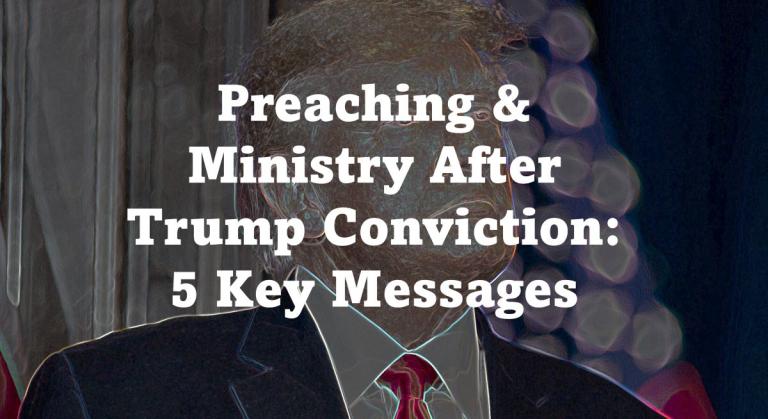Following the Trump conviction, clergy have choices for the messages they will convey to their congregation. Here are five key themes to emphasize.

News about Trump conviction affects local congregations
Like 34 flares sent up into the sky, the announcement of the Trump conviction on May 30 has lit up social media in a fireworks display of reactions. The enormity of the news has been felt worldwide and will likely spark conversation in churches this Sunday.
Whether you serve a politically red, blue, or “purple” church, if you are a pastor leading worship following the Trump conviction, you are probably facing a range of emotions and reactions from the congregation. Some are relieved, elated, or celebrating. Others are shocked, devastated, or angry. Still others are trying to steer clear of it all and avoid talking about the Trump conviction altogether.
Whatever the reactions, in the aftermath of the guilty verdict and in the lead up to the sentencing on July 11, our nation may be facing a dangerous time because some are calling for violence. This kind of divisiveness and destabilization can manifest in churches as well. In fact, these messages are already being felt in congregations where clergy are navigating political tensions among their parishioners.
How should a pastor handle their ministry in light of the news about the Trump conviction?
First, we must recognize that those voices calling for violence in response to the Trump conviction are doing damage to our country and putting people’s lives at risk. This is because there is a likelihood of stochastic terrorism in the wake of the Trump conviction.
Stochastic means “random” and terrorism is “violence motivated by ideology.” Thus, the definition of stochastic terrorism is “the public demonization of a person or group resulting in the incitement of a violent act, which is statistically probable but whose specifics cannot be predicted.”
Stochastic violence is when a leader or organization uses rhetoric to demonize a person or group of people, resulting in unpredictable violence from those who buy into the rhetoric and choose to act on it. Kyle Rittenhouse murdering protestors in Kenosha, Wisconsin is one example. The man who opened fire in an El Paso, Texas, Walmart in August 2019 in response to the “Hispanic invasion of Texas” is another.
Clergy and church leaders need to be aware of the threat of stochastic terrorism for two reasons.
First, congregations and clergy may become the target of demonizing rhetoric and violent attacks.
Clergy and church leaders need to be aware that stochastic violence against houses of worship may increase as a result of the Trump conviction and its aftermath.

This is not to be alarmist. Rather, it means taking the necessary precautions to ensure the safety of parishioners. The Secure Community Network has excellent resources for securing houses of worship and protecting the safety of a faith community. Visit their website here.
Second, there may be people in a congregation who are susceptible to violent ideology and rhetoric – enough to act on it.
Recall the self-proclaimed white supremacist who murdered nine Emanuel AME Church members in June 2015. That young man was a member of a Lutheran church.
While clergy and congregations may not always know the ideology of their members, clergy can help counter disinformation and the rhetoric of violent ideology that can lead to dangerous stochastic terrorism. Through sermons, teaching, and pastoral conversations, pastors can help lower the temperature and be a stabilizing presence.
Here are 5 key messages to convey following the Trump conviction.
1 – Our faith calls us to refrain from violence.
If you are a follower of Christ, you’ll recall that Jesus forbids his followers from responding with violence. When Peter took up a sword to defend Jesus as he was arrested in the Garden of Gethsemane, Jesus rebuked him and told him to stop his violence. “For all who live by the sword will die by the sword” (Matthew 26:52).
Thus, no kind of hateful rhetoric or calls for violence should be spoken or amplified in God’s house of worship.
The church is called to be a place of refuge. If you are a Christian, you are part of the Body of Christ, which means that you are to refrain from that kind of talk even outside of the church. That means refraining from amplifying messages of violence on your social media accounts as well.
You represent Christ in the world. Behave in a manner that reflects the One whom you worship.
2 – Sunday is the time for worship.
If you are preaching from texts in the Revised Common Lectionary, two of the readings (Deuteronomy 5:12-15; Mark 2:23—3:6) focus on honoring the Sabbath.
The gospel lesson in Mark reminds us of the purpose of our time in church. When the leaders confront Jesus about Sabbath laws, he reminds them that “the Sabbath was made for humankind,” (Mark 2:27).
This echoes the reading in Deuteronomy where God gives the command to “observe the sabbath day and keep it holy,” (Deut. 5:12).
But what does it mean to keep the sabbath holy?
Jesus challenges the religious leaders, asking, “Is it lawful to do good or to do harm on the sabbath, to save life or to kill?” (Mark 3:4).
They refuse to answer his question. Grieved by the hardness of heart, he heals a man whose hand is disfigured.
The lesson here is that our time in worship should be used for honoring God. And this should, in turn, inspire us to compassion, including feeding the hungry and healing those who are hurting.
In other words, no matter how you feel about the Trump conviction, your time in worship is for God and serving others. Gathering together, hearing God’s word, breaking bread and sharing wine, and being sent into the world in peace – this is all part of our primary objective as a worshiping community.
3 – “Let light shine out of darkness.”
Another reading for Sunday is 2 Corinthians 4:5-12. In the congregation to which Paul is writing, there are intense political divides between religious leaders, political leaders, and different factions – just like there are today.

In the midst of this, Paul puts the light of Christ front and center.
For we do not proclaim ourselves; we proclaim Jesus Christ as Lord and ourselves as your slaves for Jesus’ sake. For it is the God who said, “Let light shine out of darkness,” who has shone in our hearts to give the light of the knowledge of the glory of God in the face of Jesus Christ. But we have this treasure in clay jars, so that it may be made clear that this extraordinary power belongs to God and does not come from us. (2 Cor. 4:5-7)
So, no matter how you are reacting to the Trump conviction, God is still calling you to let “light shine out of darkness.”
What might shining light in the darkness look like for you?
Paul gives examples in the next verses. It means to hold fast even in affliction and avoid being driven to despair even when perplexed.
In other words, if you’re upset by the Trump conviction, your feelings are valid. But they are not a reason to abandon your call make the “life of Jesus visible in our bodies,” (2 Cor. 4:10).
By the same token, if you’re celebrating, your feelings are also valid. But ultimately, “we do not proclaim ourselves; we proclaim Jesus Christ as Lord,” (2 Cor. 4:5).
4 – Treasure in clay jars.
Regardless of people’s feelings around the Trump conviction, our job as the church remains the same. As Paul reminds the church in Corinth, “We have this treasure in clay jars, so that it may be clear that this extraordinary power belongs to God and does not come from us,” (2 Cor. 4:7).
Our job as the church is to share the treasure of Jesus’s teachings, no matter what is going on politically. When everyone else is distracted by the big goings-on among the powerbrokers, it’s Jesus who makes sure hungry people are fed. It’s Jesus who heals a man with a disfigured hand. It’s Jesus who shines the light in the darkness.
Let’s stand alongside Jesus and follow his gaze to see who he is paying attention to.
And then let’s get to work doing ministry in his name.
Politicians come and go. The work of the church remains.
5 – Let life work in you.
Paul acknowledges that there are opposing forces at work in each of us: “So death is at work in us, but life in you,” (2 Cor. 4:12).
What he’s telling them is that they have the power to follow the impulse toward life, even when the forces of death are seducing them into despair.
In other words, just because death is at work does not mean that we should become an instrument of violence.
Ministry on the Sunday after the Trump conviction will not be easy. But let life work in you.
Allow the liturgy minister to you and your congregation. Let it gather in all who will come. Offer prayers for healing. Set up a table with candles for people to light as symbols of their concerns or prayers. Reassure the congregation that the Spirit of God through the compassion of Jesus Christ is in our midst.
Stay grounded in scripture and prayer. Tending to self-care. And stay connected to networks of trusted colleagues for support.
As you navigate these difficult times, know that your faithfulness, your proclamation of the gospel, and your pastoral heart are making a difference.
I’m thankful to members of the Clergy Emergency League Steering Committee for contributing ideas for this article.
Read also:
Trumpism is a Starfish, not a Spider. How should churches respond?
Truth or Trump: Christians Must Decide (Guest Sermon)

The Rev. Dr. Leah D. Schade is the Associate Professor of Preaching and Worship at Lexington Theological Seminary in Kentucky and ordained in the ELCA. Dr. Schade does not speak for LTS or the ELCA; her opinions are her own. She is the author of Preaching in the Purple Zone: Ministry in the Red-Blue Divide (Rowman & Littlefield, 2019) and Creation-Crisis Preaching: Ecology, Theology, and the Pulpit (Chalice Press, 2015). She is the co-editor of Rooted and Rising: Voices of Courage in a Time of Climate Crisis (Rowman & Littlefield, 2019). Her newest book is Introduction to Preaching: Scripture, Theology, and Sermon Preparation, co-authored with Jerry L. Sumney and Emily Askew (Rowman & Littlefield, 2023).













